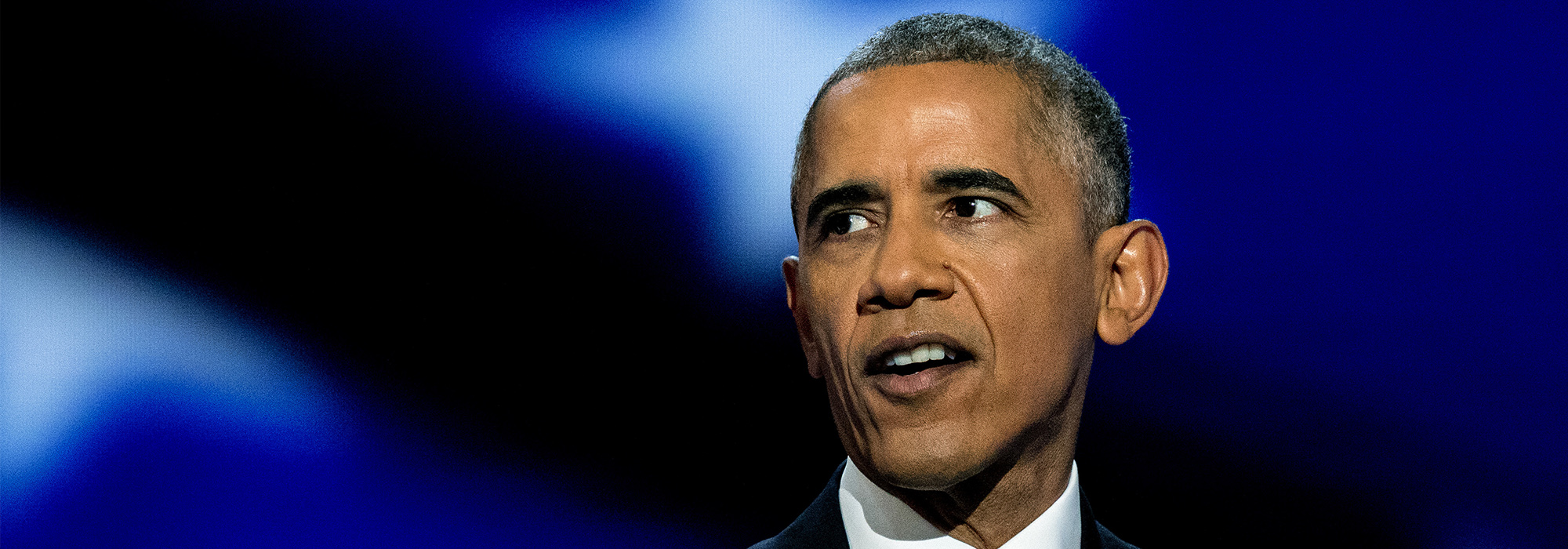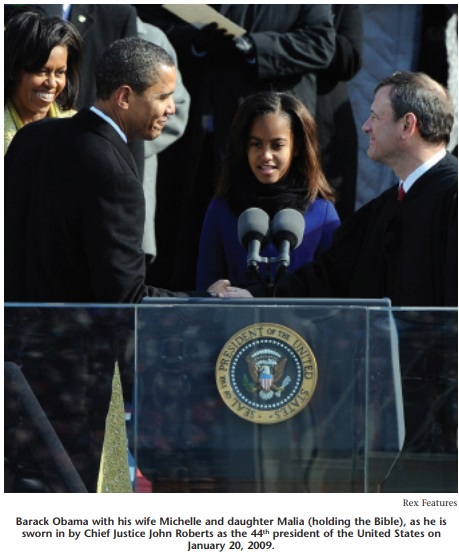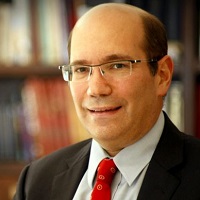
Barack Obama ends his first year in office well aware that as hard as it was to win the presidency, actually doing the job is even harder. Amid the euphoria of his election last year, as Americans delighted in the fact that they had just elected their first African-American president, one comedy poster playing on America’s tragic racial history proclaimed: “Black guy gets worst job in America.” Let us hope that history is kinder to Barack Obama than the sign is and the first year has been. Given all the challenges the United States faces, it will be tragic if his greatest achievement remains his election and if his epitaph is that managing the presidency is indeed an impossible task.
Still, do not underestimate that initial achievement of simply getting elected, which may alone be worthy of a Nobel Peace Prize. The Nobel committee — which should have waited for some real achievements on the world stage — nevertheless beautifully described Obama’s greatest accomplishment so far, saying: “Only very rarely has a person to the same extent as Obama captured the world’s attention and given its people hope for a better future.” The fact that despite the stains of slavery, Jim Crow and racism, the United States sent a black man to the White House was a modern miracle. That this president was only 47 when elected and had, by his own description, a “funny name” is even more amazing, especially following 9/11.
Obama’s election in November 2008 and his inauguration in 2009 gave the world two magical moments. On election night, the tears streaming down black and white faces the world over said it all. Both John McCain — remember him? — and Barack Obama played their parts magnificently. McCain was gracious, patriotic, generous — qualities that were frequently missing during the campaign. Obama was equally elegant and eloquent, weaving together a voyage through 20th-century American history by telling the story of one 106-year-old African-American voter, and once again immortalizing the slogan he basically coined but treated as historic: “Yes we can.”
The inauguration was equally magical, expressed through the warm feelings that overcame the minus-8degree weather, and immortalized through extraordinary iconography in pictures, posters postcards, and handouts that popped up all over the Washington Mall. Images juxtaposed Obama with Martin Luther King, linking the August 1963 march on Washington, which filled the Mall from the Lincoln Monument, with the January 2009 Obama inauguration, which filled the Mall from the Capitol to the Lincoln Monument. Some artists depicted Barack and Michelle Obama as the Egyptian pharaoh Akhenaton — King Tut’s father — and his chief consort, Nefertiti.
Since then, such images and slogans have filled our global village. I have seen home shrines to Obama in ChaÌ‚teauguay and have heard of elaborate shrines in huts in Kenya. During this dark recession year, America’s single greatest export has been the hope Obama transmitted to billions of the disillusioned, the oppressed and the discriminated against throughout the world. That all this occurred in a year of economic upheaval and after the sour, angry, divisive George W. Bush years is just short of miraculous.
Still, at the inauguration, Obama seemed sobered by America’s unrealistic expectations amid such crushing challenges. While Obama’s inauguration was moving, his address was muted. Now, Obama is such a master speechmaker that, as it was when Babe Ruth swung a bat, anything less than a game-winning homer disappoints. Obama seemed determined to manage Americans’ expectations, warning that America’s problems cannot be solved simply by sloganeering.
Obama understands that the growing cult of personality surrounding him is a great asset, giving him a mandate to succeed. But he also knows that hope is like a balloon if properly inflated it soars into the sky, dazzling, delighting, and elevating, but if overblown, it pops. The frenzied hopes his election triggered could sour.
Shrewdly, pragmatically, constructively, Obama wants to channel this energy into a badly needed sense of communal renewal. His campaign slogan was “Yes we can,” not “Yes I can.” Barack Obama is a great nationalist. He understands that while nationalism can be ugly and destructive, it can also be a force for good. Nationalism is community writ large; it can pull individuals out of their selfish orbits, launching them into a universe of good works and great achievements. In his inaugural address, trying to solve the decades-long debate about the size of government, Obama reframed the question, saying, “The question we ask today is not whether our government is too big or too small, but whether it works.” He then articulated an activist nationalist vision that empowered the people, saying, “For as much as government can do and must do, it is ultimately the faith and determination of the American people upon which this nation relies. It is the kindness to take in a stranger when the levees break, the selflessness of workers who would rather cut their hours than see a friend lose their job, that sees us through our darkest hours. It is the firefighter’s courage to storm a stairway filled with smoke, but also a parent’s willingness to nurture a child, that finally decides our fate.”
At the inauguration, Obama seemed sobered by America’s unrealistic expectations amid such crushing challenges. While Obama’s inauguration was moving, his address was muted. Now, Obama is such a master speechmaker that, as it was when Babe Ruth swung a bat, anything less than a gamewinning homer disappoints. Obama seemed determined to manage Americans’ expectations, warning that America’s problems cannot be solved simply by sloganeering.
Similarly, regarding foreign policy, Obama tried to resolve the fight between realists emphasizing America’s needs and idealists hoping to spread democracy and other American ideals worldwide. Thanks to the backlash against George W. Bush’s overselling of democratic hopes in Iraq and elsewhere, the realist school is ascendant — frequently displaying a strong isolationist streak. Obama’s initial campaign focus on just getting out of Iraq played to Americans’ historic isolationism. But minutes into the job, Obama already acknowledged that the world looks very different when viewed from the Oval Office’s big, bulletproof picture window. Moreover, the surge stabilized Iraq, precluding a quick withdrawal. And while Obama relies on some realist advisers, he is imprisoned by his own soaring rhetoric and aspirations. Obama does not just want his administration focusing on what is right for his country; he wants what is right for his country to be right for the world. Just as true isolationism is impossible for the world’s only superpower, neither can any American, let alone Obama the hope generator, avoid the idealistic impulses in the country Obama’s hero Abraham Lincoln deemed “the last best hope of earth.” For all those reasons, Obama declared when inaugurated: “As for our common defence, we reject as false the choice between our safety and our ideals.”
In launching his administration, Obama promised to govern as he speechifies, creating a “Yes we can” muscular moderation that advances a substantive agenda in ways millions of Americans in the big, broad, pragmatic centre can applaud. Alas, the descent from “Yes we can” to “I screwed up” was rapid — and unnerving. Obama’s administration started off with a Keystone Kops cabinet farce, which included two attempts to find a commerce secretary, a treasury secretary who was a tax slob and a health and human services nominee and potential health czar who withdrew due to tax troubles. These stumbles would have derailed his administration if the press corps had not been so dazzled by Obamania, and would have made George W. Bush a laughing stock had he made similar personnel errors.
This narrative suggests political bias, that the so-called “liberal media” was tough on George W. Bush, the Republican, and soft on Barack Obama, the great liberal democratic hope. But former president Bill Clinton was pummelled mercilessly when his nominees ran into nanny trouble. Careful analysis of the 2008 presidential campaign will discover a systematic pro-Obama bias. His story was fresher, more compelling and thus less scrutinized than Hillary Clinton’s, John McCain’s or those of the other also-rans. Some journalists now admit to liking Obama, loving the idea of Obama and frequently giving him a free pass — which continues.
There may also be a more benign explanation. The financial meltdown sobered Americans — and reporters. Barack Obama’s call for a new, more constructive politics resonated. This really is not the time for the kind of partisan, “gotcha” bickering that has marred our politics for so long.
All this made Obama’s early fumbles so disturbing. The stakes were too high for amateur hour. Obama never explained why his personnel process has been so incompetent. But he learned. Since then, the administration has run smoothly, in the style of “No-drama Obama.” The problems have stemmed from America’s vexing problems, at home and abroad.
Barack Obama never anticipated becoming a recession president, which has definitely cramped his style. He has governed further left than he campaigned, even though many progressives are also critical of his leadership thus far.
Countering America’s tradition of moderate, bipartisan presidential leadership is an equally vibrant tradition of moderate masqueraders, partisans obscuring their sharp political elbows with bipartisan rhetoric. In 1968, Richard Nixon ran to heal his fragmented nation as the “new Nixon.” Six years later, he resigned, his presidency derailed by his partisan overreaction to the student protests that triggered the Watergate scandal. In 2000, George W. Bush promised to unite America, only to govern as a divisive president. One year into his presidency, Barack Obama wavers. At his best, he has wooed Republicans, seeking a new, welcoming centre for a nation reeling from economic cataclysm, continuing foreign threats and Bush’s tumultuous tenure. At his worst, President Obama has indulged congressional Democrats and party sensibilities rather than offering the moderate statesmanship America needs.
Obama’s presidency is unfolding. John Kennedy proved more successful as president than his first year suggested, marred as it was by the failed Bay of Pigs Cuban invasion; Lyndon Johnson and George W. Bush ended their respective presidencies less successfully than each began; and Ronald Reagan made more of a mark domestically in his first seven months than in the following seven years. During this first year, a presidential character starts forming. The first year launches many story lines that ultimately determine a president’s destiny.
President Obama’s debut has been less bold than he promised and, frankly, confusing. Regarding foreign policy, his rhetoric has veered left but his actions have stayed centrist, although he shows an annoying tendency to slight friends and nuzzle enemies. Domestically, his rhetoric has been more moderate than his policies.
Obama’s foreign affairs messaging has positioned him as the “un-Bush.” From apologizing for American “arrogance” in Europe to smiling with Venezuela’s Hugo Chavez, to bowing to the Saudi ruler and denouncing torture, Obama has enraged conservatives. But he has not acted like the pushover he sometimes appears to be. He is keeping troops in Iraq. He has intensified the military push in Afghanistan, adding 30,000 troops to the 20,000 more he previously ordered in, bringing American troop strength there to nearly 100,000 and making it Obama’s war. And he gave the shoot-to-kill order when Somali pirates held an American hostage.
Most disturbing, however, have been his instincts on Iran and on terrorism. When the Green Revolution began, Barack Obama, the biggest rock star on the world political scene today, was silent. He waited far too long before expressing his approval of these Iranian-dissident heroes, and even now, months later, he has not made supporting the Green Movement as much of a priority as he should have. At the same time, after the Fort Hood massacre, he spoke formalistically and officiously, ignoring the obvious ideological links between the perpetrator of the crime and Islamist ideology. Even after Umar Farouk Abdulmutallab tried to blow up a plane on Christmas Day, Obama preferred to speak in legalese. In fairness, with Iran, Fort Hood and al-Qaeda’s Christmas bombing attempt, Obama eventually spoke forcefully, but his first reactions revealed a resistance to acknowledging the evil emanating from Islamist jihadist ideology.
At the same time, Obama and his team have often slighted America’s friends. Early on, the congressional lurch toward protectionism upset many Canadians, who were downright offended when Secretary of Homeland Security Janet Napolitano compared the placid Canadian border to the tumultuous Mexican border. The British press was miffed by Obama’s cool greeting of Prime Minister Gordon Brown, and Israelis have been pressured far more frequently than the Palestinians.
At its best, with both friend and foe, Obama’s foreign policy has used George W. Bush as a straw man to appear to be hitting the oft-mentioned “reset button,” without acting irresponsibly. Too frequently, Obama’s insistence on being the “un-Bush” suggests a sort of moral confusion. Sometimes, however, it works. Obama’s approach to the Durban antiracism review conference in Geneva this spring exemplified his strategy at its best. In sending diplomats to preliminary meetings, Obama showed he would engage the world, unlike his predecessor. By nevertheless boycotting it because too many delegates from Muslim countries pushed their anti-Israel, anti-Western, and anti-freespeech lines, Obama acted properly, but with greater credibility.
So far, there have been no major disasters on Obama’s watch — but no major successes either. North Korea and Iran continue to develop nuclear power: North Korea launched missiles on July 4 to defy Obama, while Iran’s Mahmoud Ahmadinejad stole an election and cracked down on democratic forces with barely a peep from the US President. Moreover, the December 31 deadline for sanctions to stop Iranian nuclear development came and went with no action. Obama has kept pressing al-Qaeda with drone attacks, the Taliban with talk of more troops, Iraqi anarchists by refusing to withdraw precipitously. But the Russians seem to think he can be pushed around. And even with Obama in office, the world is menaced by ignoble characters who disdain his noble aspirations. The jury is still out on whether Obama’s politics of hope and diplomacy of engagement can work in a world of al-Qaeda killers, North Korean dictators, Iranian madmen, Iraqi insurgents, Taliban fanatics, Afghan warlords, Pakistani generals, Russian strongmen, Saudi sheiks, Sudanese slaughterers, Guinean rapists and Hamas terrorists. The presidential learning curve, especially in foreign affairs, can be steep.
The presidency, despite being the world’s most scrutinized job, is also ever-changing, providing more plot twists than an Alfred Hitchcock movie. Nikita Khrushchev bullied John Kennedy when they first met in Vienna in 1961, only to be outmanoeuvred by a more experienced JFK during the October 1962 Cuban missile crisis.
Ultimately, Obama must define his foreign policy more clearly. He will have to remind Muslims how many Americans died trying to protect Muslims in Kosovo, Somalia, Iraq and Afghanistan, rather than simply apologizing for Bush’s “war on terror.” And the Obama administration will have to find its moral centre, rather than disappointing dissidents worldwide when Secretary of State Hillary Clinton says human rights issues will not divide the United States and China.
Of course, Obama’s greatest challenge has been righting America’s economic ship of state. Watching the confusion among our supposed experts, seeing how many smart people made such a mess, the President probably is as baffled as the rest of us. Just as it is easy during boom times to forget that a bust may soon come, it is easy to forget downturns are cyclical and fleeting too. The President lacks the luxury of waiting it out. Obama argues that too little governmental response in the 1930s made matters worse — forgetting that too much governmental intervention in the 1970s was equally harmful.
Rhetorically, Obama has been thoughtful and reasonable. His April 14 speech at Georgetown University was a model of moderate leadership. Acknowledging critics left and right, he sounded balanced, systematic and visionary. He invoked the Sermon on the Mount — not to perpetuate squishy liberal sentiments about helping others, but to explain the importance of rebuilding on firm foundations. He affirmed his liberalism by delineating new “pillars that will grow our economy and make this new century another American century,” including “new rules for Wall Street” and new investments in education, renewable energy and technology, and health care. But Obama showed he was a liberal who had learned from Ronald Reagan. He added a fifth pillar, “new savings in our federal budget,” and insisted that like a good doctor, the government primarily must do no harm.
Unfortunately, on Capitol Hill and in practice Obama has been less artful. While he watched the Super Bowl with some Republicans, most Republicans resented how Democrats burdened the economic stimulus package with so many items that long lingered on Congressional wish lists. More broadly, Obama is trying to spend his way out of the recession with a classically Keynesian, big-government approach. At Georgetown, Obama invoked Bush’s policies to justify his actions as centrist moves — even though conservatives criticized Bush’s big-spending deviation from Reaganite orthodoxy.
Given the economic bewilderment and despair, Obama is angling for a win-win. If the economy is not as broken as the conventional wisdom now suggests, all Obama needs is a recovery before 2012, which would be a very long recession. If the economy revives, he will replicate Ronald Reagan’spositionin1984, declaring a new “morning in America” that validates Obamanomics as he coasts to reelection.
Of course, much history could intrude between now and then, ruining this scenario. Obama has been cursed by the depth and complexity of this financial crisis. So far, he has blamed Bush. But, as Ronald Reagan learned, presidential successes early on — and pie-in-the-sky promises about saving the economy — quickly make the incumbent responsible. In 1981, Reagan blamed Jimmy Carter and the Democrats for the great inflation, high interest rates and crushing budget deficits he inherited. After many legislative successes and hope-laden speeches that culminated in August 1981, seven months into his presidency, the economy nosedived. When Congress returned from its summer recess, Democrats blamed their constituents’ suffering on the “Reagan Recession.”
The $787-billion stimulus plan could end up being Obama’s albatross. He erred by allowing the congressional pork kings to dictate the legislation, burdening it with pet projects rather than smart stimuli. He further erred by forgetting his vows of bipartisanship and post-partisanship, thus failing to share responsibility with the Republicans. By veering as far left as he has domestically, by playing the hard partisan game he has, he risks following in the footsteps of Jimmy Carter — who six months into his presidency scored about 10 percentage points higher than Obama has in public approval surveys. And Obama is now entering a particularly difficult passage in his presidency as he tries to overcome the health care reform curse that stymied Bill Clinton, another young charismatic Democrat with great potential.
Obama ended 2009 with passage of his health care Bill looking likely. The change could be as historic as Lyndon Johnson’s Medicare Bill or Franklin Roosevelt’s Social Security Act. But those two reforms enjoyed true bipartisan support. Although Democrats rejoiced when the Maine Republican senator Olympia Snowe supported the Bill, one moderate maverick crossing the aisle does not make the Bill truly bipartisan. Mistaking a deviation for a trend in politics is like mistaking one defection for a peace treaty during wartime.
Obama ends his first year in office with the potential to be either as popular as Ronald Reagan or as ineffectual as Jimmy Carter. He has displayed a Reaganesque ability to get things done — and sell himself effectively — while also revealing a Carteresque tendency to lack backbone when facing America’s enemies, America’s greatest domestic challenges and an overconfident Democratic Congress. But Obama enters year two with three great assets that will help him govern — clear talents in politicking; a smart, savvy, now battle-tested staff; and, most important of all, the goodwill of the American people and billions the world over, most of whom really, really want this new president to succeed.
Photo: Mark Reinstein / Shutterstock










